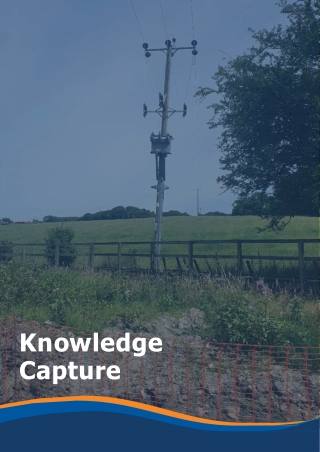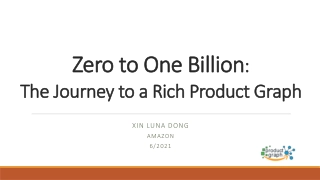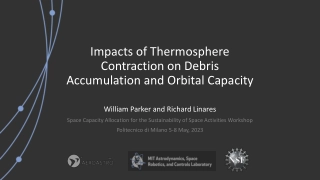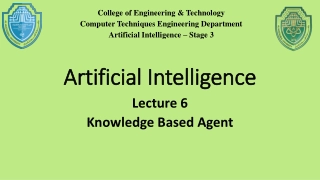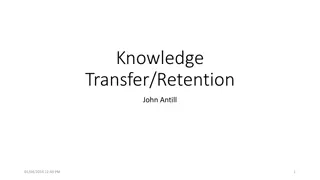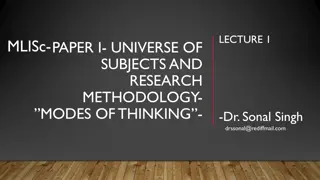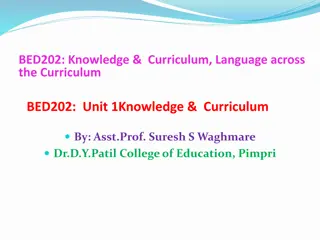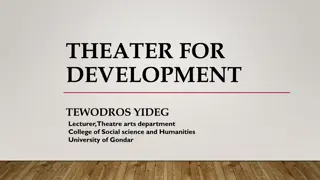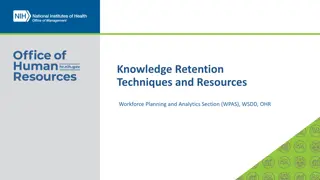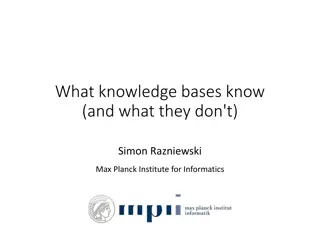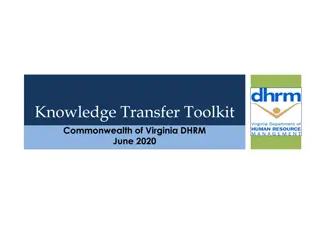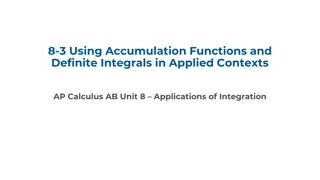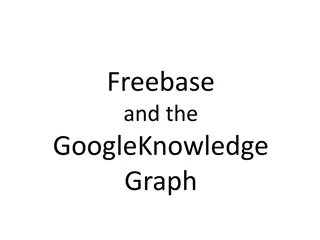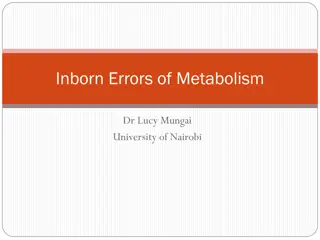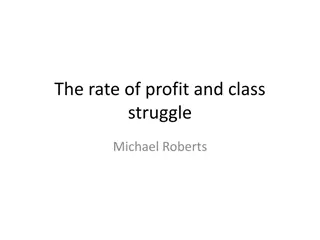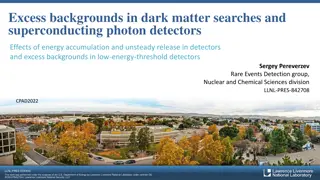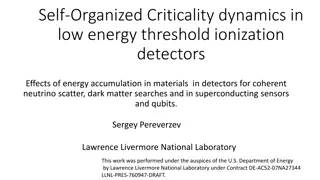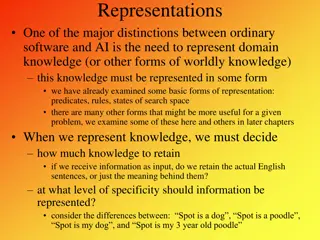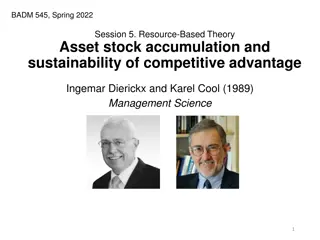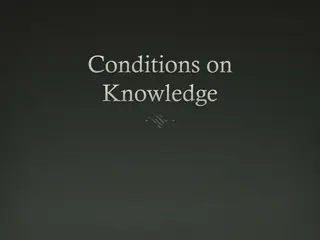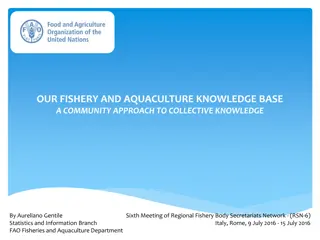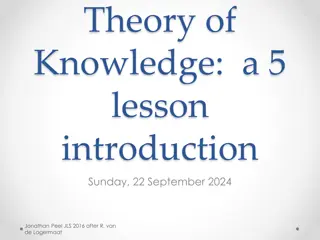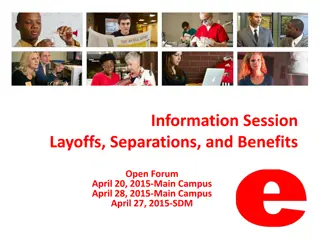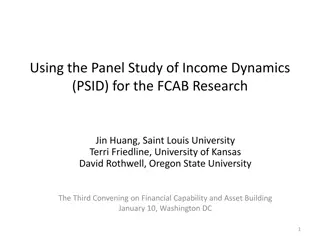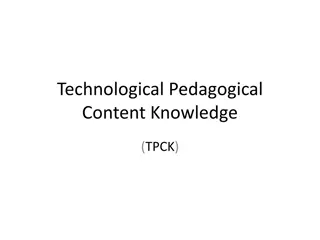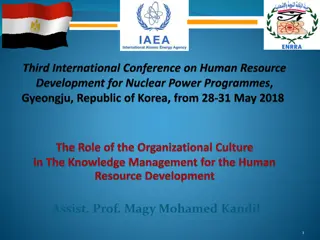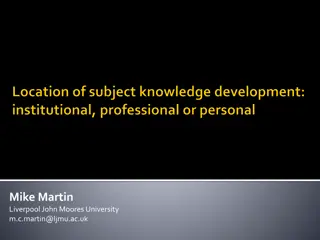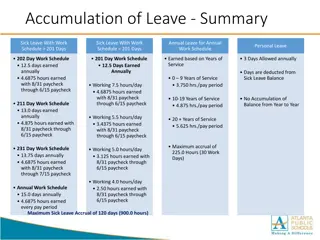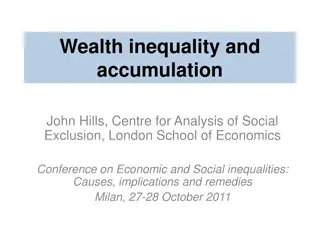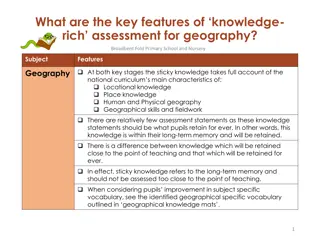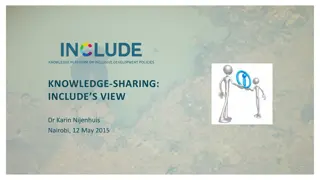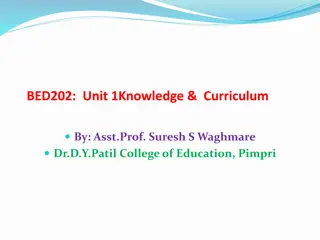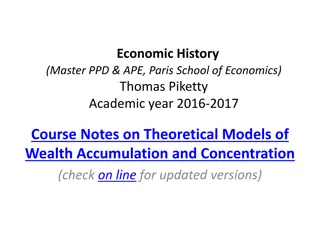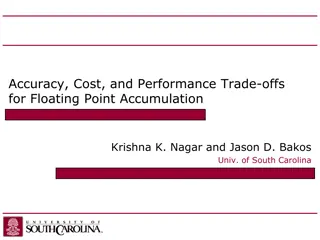Knowledge Capture
Knowledge capture is crucial for organizations to retain valuable expertise and prevent loss of critical knowledge due to employee turnover. Tacit and explicit knowledge play key roles, requiring strategic planning for retention, incentivizing knowledge-sharing culture, and implementing effective st
0 views • 6 slides
Exploring Product and Knowledge Graphs for Enhanced Information Retrieval
Dive into the world of product and knowledge graphs, uncovering the journey to a rich product graph, examples of knowledge graphs for songs, and the mission to provide comprehensive information on products and related knowledge. Discover use cases ranging from information provision to enhancing sear
3 views • 76 slides
Impacts of Thermosphere Contraction on Debris Accumulation and Orbital Capacity
Explore the effects of thermosphere contraction on debris accumulation and orbital capacity, as discussed in a workshop at Politecnico di Milano. Satellite observations reveal increasing COx levels, impacting the upper atmosphere's chemistry. The concern for space debris management is highlighted, e
1 views • 29 slides
Understanding Knowledge-Based Agents in Artificial Intelligence
Knowledge-Based Agents in AI utilize logic and knowledge representation to accept tasks, learn, and adapt to changing environments. Logic plays a crucial role in forming complex world representations and deriving actions based on inference. The central component is the Knowledge Base (KB), represent
4 views • 19 slides
Understanding Knowledge Management: Processes and Frameworks 2. In knowledge management, organizations create, share, and manage knowledge to enhance performance. It involves acquiring different types of knowledge through various means, such as perc
Knowledge Management, Organizational Objectives, Types of Knowledge, Tacit Knowledge, Explicit Knowledge
1 views • 17 slides
Understanding Negative Results in Systems Research
Systems research encompasses various areas such as operating systems, networking, and distributed systems. Negative results in systems research often go unpublished, leading researchers to focus on curating positive outcomes. This practice can hinder the credibility of scientific findings and impede
5 views • 23 slides
Pedagogical Shift in Physical Science: Constructing Knowledge Through Learner-Centered Experiences
There is a significant pedagogical shift in physical science education from viewing science as a fixed body of knowledge to emphasizing the process of constructing knowledge. Learners are now placed at the center stage, engaging in inquiry-based learning, critical thinking, and collaborative interac
3 views • 21 slides
Importance of Knowledge Retention in Organizations
Organizations face negative impacts on performance due to the loss of knowledge. Strategies such as exit interviews, mentorship, and knowledge sharing tools are vital for effective knowledge retention. Assessing knowledge retention maturity through various techniques is crucial, aligning with ISO st
0 views • 11 slides
Understanding Modes of Thinking and Knowledge Development
Man's acquisition of knowledge is intricately linked to his ability to think, reason, and perceive. Knowledge is a result of experiences gained through perception, intellect, and intuition. The history of humanity is a story of knowledge acquisition and development, with man at the forefront as the
1 views • 18 slides
Understanding Data, Information, Knowledge, and Curriculum in Education
Data is raw facts and figures, information is interpreted data with meaning, and knowledge is the accumulation of facts and information. The nature of knowledge involves acquiring information from real-life experiences and education. This content delves into the distinctions between data, informatio
0 views • 64 slides
Understanding Development Through Various Perspectives
Development is a complex concept encompassing societal capacity, individual well-being, and multi-dimensional improvements. Scholars like Gene Shackman, Octavio Paz, and Rodney offer diverse viewpoints on development, emphasizing social organization, growth, and material well-being. Key aspects of d
0 views • 47 slides
Effective Knowledge Retention Strategies in Workforce Planning and Analytics
Retaining knowledge is crucial for organizations to enhance customer service, foster innovation, improve efficiency, and bridge skill gaps. This article explores the significance of knowledge retention, the types of knowledge essential for succession planning, and two effective strategies - the Know
1 views • 10 slides
Exploring Knowledge Base Construction and Commonsense Knowledge in Fiction
Delve into innovative research interests focusing on knowledge base construction using fictional texts as archetypes, taxonomies for constructing knowledge bases, and extraction of commonsense knowledge from diverse sources. Challenges such as sparsity and semantics are addressed through comprehensi
3 views • 48 slides
Knowledge Transfer Toolkit for Organizational Success
This toolkit, developed by the Commonwealth of Virginia DHRM in June 2020, covers the essentials of knowledge transfer, including its definition, impact, challenges, and management strategies. It emphasizes aligning knowledge transfer with strategic goals, overcoming barriers through leadership supp
2 views • 15 slides
Understanding Accumulation Problems and Definite Integrals in Applied Calculus
Explore the interpretation of definite integrals in accumulation problems, where rates of change are accumulated over time. Learn how to solve accumulation problems using definite integrals and avoid common mistakes by understanding when to use initial conditions. Discover the relation between deriv
0 views • 9 slides
Evolution of Freebase and the Google Knowledge Graph
Freebase was initially created in 2005 as an open shared database of knowledge, later acquired by Google and absorbed into the Google Knowledge Graph. Its approach included crowdsourcing updates and additions, focusing on data rather than text. The schema of Freebase included around 1500 types, 3500
1 views • 12 slides
Understanding Inborn Errors of Metabolism and Metabolic Disorders
Inborn Errors of Metabolism (IEM) are genetic disorders that disrupt metabolic pathways, leading to substrate accumulation or product deficiency. These disorders can be classified based on toxic accumulation, protein metabolism, carbohydrate intolerance, lysosomal storage issues, energy production d
0 views • 29 slides
Understanding the Law of Profitability in Capitalist Accumulation
Explore the relationship between the rate of profit, class struggle, and capitalist accumulation. From the general law of accumulation to the law of profitability, examine how displacing labor affects the average rate of profit and learn about Marx's law of profitability. Discover the evidence from
0 views • 17 slides
Dark Side of the Afterglow: Complications in Dark Matter and Rare Events Searches
Exploring the challenges in detecting dark matter and rare events due to energy accumulation, excitation clustering, and avalanche relaxation events. Discusses issues such as low-energy background, ionization load on detectors, dual-phase detectors, universal scenarios of energy accumulation, and en
0 views • 15 slides
Insights into Excess Backgrounds in Dark Matter Searches and Energy Accumulation Effects in Detectors
Explore the impact of excess backgrounds in dark matter searches, energy accumulation, and unsteady releases in detectors. Delve into the implications on low-energy-threshold detectors and the emergence of complex effects in various detector types due to energy accumulation and delayed releases.
3 views • 23 slides
Investigation of Self-Organized Criticality Dynamics in Low Energy Threshold Ionization Detectors
Exploring the effects of energy accumulation in materials in detectors for coherent neutrino scatter, dark matter searches, and superconducting sensors and qubits. Focus on condensed matter effects, responsivity, background, and a hypothesized universal condensed matter mechanism. Touches on energy
0 views • 16 slides
Understanding Knowledge Representation in Artificial Intelligence
In AI, representing domain knowledge is crucial and comes in various forms like predicates, rules, and search space states. Deciding the level of specificity and form of representation is key. Knowledge can be categorized into procedural, domain, and common sense knowledge, available in forms such a
2 views • 32 slides
The Importance of Asset Stock Accumulation for Sustainable Competitive Advantage
Strategy literature often overlooks the crucial role of building and accumulating non-tradeable asset stocks for achieving and safeguarding competitive advantage. The concept of asset stock accumulation provides a complementary framework to evaluate the sustainability of a firm's competitive edge, e
1 views • 7 slides
Exploring Epistemology: Understanding Knowledge and Truth
Epistemology delves into the nature of knowledge, understanding, wisdom, and justification, questioning the extent of human knowledge and the different kinds of knowledge. It explores skepticism and conditions on propositional knowledge, discussing whether knowledge implies truth and the debate betw
1 views • 54 slides
Navigating the World of Big Data, Knowledge, and Crowdsourcing
The world has evolved into a data-centric landscape where managing massive amounts of data requires the convergence of big data, big knowledge, and big crowd technologies. This transformation necessitates the utilization of domain knowledge, building knowledge bases, and integrating human input thro
1 views • 5 slides
Enhancing Fisheries and Aquaculture Knowledge for Sustainable Development
The Fishery and Aquaculture Knowledge Base, presented at the Sixth Meeting of Regional Fishery Body Secretariats Network, focuses on collective knowledge exchange in the fisheries and aquaculture sector. This knowledge hub offers a wealth of information on various aspects, supporting Sustainable Dev
0 views • 13 slides
Exploring the Nature of Knowledge in Theory of Knowledge
Delve into the essence of knowledge with Jonathan Peel's introduction to Theory of Knowledge, pondering on how different disciplines perceive knowledge, the impact of empirical questioning, and timeless wisdom on ignorance and progress. Explore the concept of basic knowledge and its implications, in
0 views • 37 slides
Employee Layoffs, Separations, and Benefits Training Session
This training session on employee layoffs, separations, and benefits provides crucial information on employee classifications, civil service rules, seniority, layoff procedures, re-employment, and employee benefits. Topics covered include different employee classifications, civil service seniority,
0 views • 21 slides
Exploring Asset Accumulation and Financial Capability with PSID Data
Explore the Panel Study of Income Dynamics (PSID) data for research on financial capability and asset building. PSID is a longitudinal survey tracking households since 1968, covering various topics like wealth, savings, pensions, and more. The data allows for studying intergenerational dynamics, wea
0 views • 5 slides
Understanding Modelling Knowledge and Knowledge Representation
Explore the significance of modelling knowledge through knowledge representation, making it explicit, independent, and reusable. Learn why knowledge representation is essential and how it facilitates exchange, query, inference, and visualization. Delve into examples of knowledge application in vario
0 views • 30 slides
Understanding Technological Pedagogical Content Knowledge (TPCK)
Technological Pedagogical Content Knowledge (TPCK) is a framework developed by Punya Mishra and Matthew J. Koehler that integrates content, pedagogy, and technology for effective teaching. TPCK emphasizes the interaction between these three key components to enhance technology integration in educati
0 views • 55 slides
Enhancing Human Resource Development through Knowledge Management
Monitoring and improving human performance in nuclear facilities is a key challenge, with knowledge management playing a crucial role in increasing staff competence. Organizational culture influences knowledge-sharing success. Explore the components of knowledge management, its importance in nuclear
0 views • 17 slides
Understanding Subject Knowledge Development in Education
Exploring the complexities of subject knowledge development in education, this study delves into areas such as students' existing knowledge, competencies, and the role of institutions in shaping knowledge acquisition. The focus lies on personalizing knowledge to individual needs rather than a fixed
1 views • 22 slides
Leave Accumulation Summary for Employees
Detailed information on the accumulation of various types of leave (sick, annual, personal) based on different work schedules and years of service. The summary covers accrual rates, maximum accrual limits, days earned annually, and deductions from leave balances.
0 views • 6 slides
Wealth Inequality and Accumulation Paradoxes in the UK
UK's wealth distribution and accumulation exhibit paradoxes despite high income inequality, with inheritance patterns and wealth measures not aligning with international trends. Personal wealth importance has increased, and individual wealth distribution has remained relatively stable over decades,
0 views • 20 slides
Key Features of Knowledge-Rich Assessment in Geography at Broadbent Fold Primary School
Broadbent Fold Primary School emphasizes sticky knowledge in geography assessment focusing on locational knowledge, place knowledge, human and physical geography, and geographical skills. Assessment statements aim to facilitate long-term retention of knowledge, vocabulary acquisition, and fieldwork
0 views • 8 slides
Knowledge Sharing and Inclusive Development Policies
Knowledge Platform on Inclusive Development Policies (INCLUDE) focuses on enhancing research utilization in policy-making to foster more inclusive development. It was established in 2012 with the aim of bridging the gap between research and policy processes in African countries. INCLUDE engages expe
0 views • 8 slides
Understanding Data, Information, Knowledge, and Their Characteristics
Data is raw facts and figures, while information is processed data that holds meaning for users. Knowledge is the accumulation of information and facts acquired through experience or education. Each has distinct characteristics and plays a vital role in decision-making and understanding the world ar
0 views • 71 slides
Theoretical Models of Wealth Accumulation and Concentration
Explore theoretical models such as the pure lifecycle model, dynastic model, and random-shocks model to understand wealth accumulation, inheritance, and concentration. Dive into concepts like the Harrod-Domar-Solow formula and saving rates to analyze the dynamics of wealth growth over time.
0 views • 46 slides
Trade-offs in Floating Point Accumulation: Balancing Accuracy, Cost, and Performance
When designing floating point accumulation systems, achieving high throughput and accuracy presents a challenging trade-off. Inconsistent accuracy due to data dependencies can lead to significant errors in results. Strategies such as compensated summation or using extended precision adders can help
0 views • 11 slides
